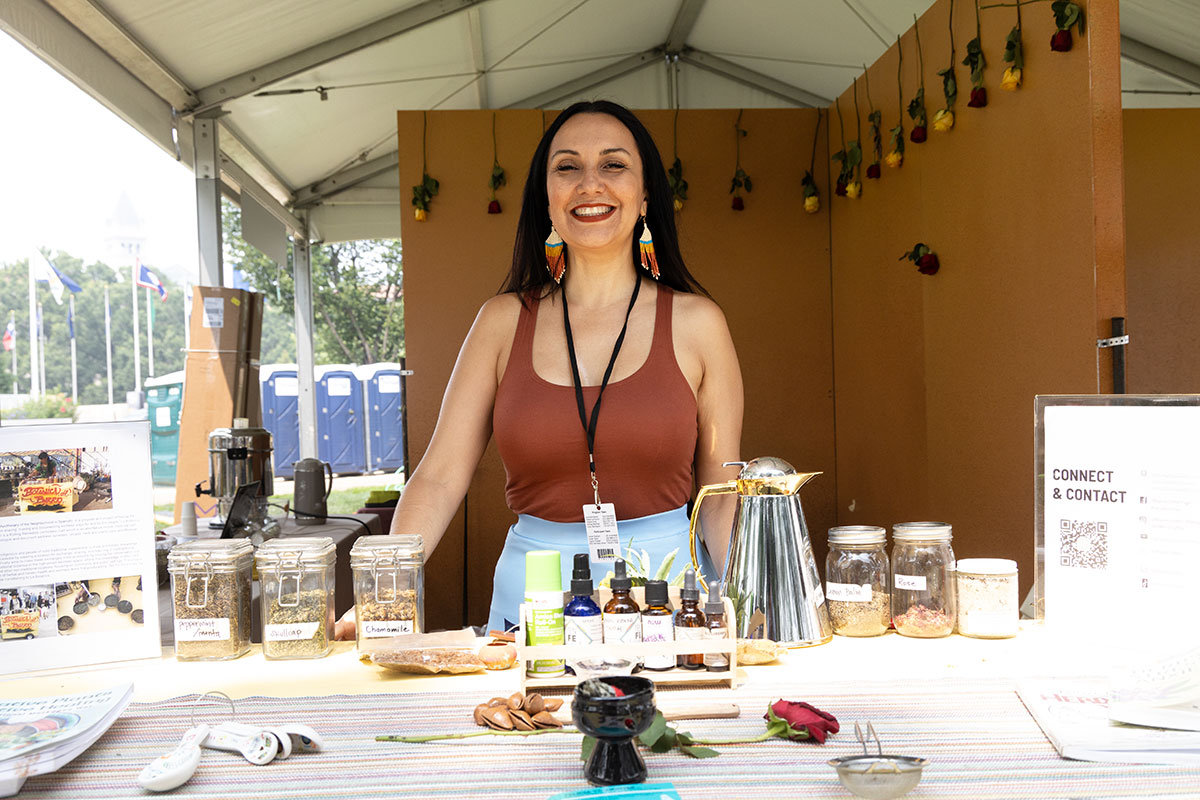How Felicia Montes’s Botanica del Barrio Harnesses Herbs as a Tool for Connection

Photo by Phillip R. Lee, Ralph Rinzler Folklife Archives
“Right now, with the disrespect or imbalance of so many things in the world, it’s really key to remember that we’re all connected.”
Felicia Montes’s key to connection? Healing plants.
She sat grinning behind a lineup of various herbs on her cart. She was watching someone who, upon reading the words “Botanica del Barrio” painted on the side, ran off exclaiming, “I need to get my grandmother!”
Montes, an East Los Angeles resident of Xicana heritage, is creator and co-founder of Mujeres de Maiz, “Womxn of the Corn.” Founded in 1997, the grassroots organization promotes holistic well-being to women of color. “We do so by sharing our own specific blend of mind, body, spirit, and cultural work,” Montes said.
At the 2023 Smithsonian Folklife Festival, Montes shared her Botanica del Barrio program, a rolling remedy or mobile medicine cart used to educate and promote dialogue about herbs, recipes, and traditional Mexican medicine.
Montes guided me through her selection of herbs. She explained the different healing properties of each: skullcap is used to treat anxiety, lemongrass for nausea, and chamomile for cramps, to name a few. While visitors were able to walk away with new understanding of these medicinal herbs, along with their own tea blend for later, Montes works to foster dialogue that reconnects people with knowledge that all families and cultures once shared.
“It promotes intergenerational conversations and reconnects people with knowledge that’s already in front of us.”



Montes, who learned about the healing properties of herbs from her own family, is passionate about revisiting the wisdom of the past, believing this is a direct way to revive people’s interest in their family histories and cultural practices.
At the Festival, she experienced beautiful moments of connection between mothers and daughter and fathers and sons, right in front of her cart, much like the discussions that went on in her own family and inspired her work in holistic health. Some visitors compared the ways in which their relatives use these specific herbs and teas and fell into conversations regarding their ethnic and cultural backgrounds. Many visitors took a sniff of one of the herbs at her display and exclaimed things like, “These smells remind me of my aunt!” or “My mom used to make me tea like this.” Moments like these are tangible embodiments of the cart’s mission: to help visitors understand the interconnectedness of all living things and people.
This idea is key to Montes’s use of herbs and their healing properties. She referenced the overwhelming amount of information and news we have access to through our technology and media sources. “We need more than ever to take care of ourselves mentally, physically, emotionally, and spiritually. And so, herbs, in my culture, in Mexico and Indigenous nations across the world, are used for body support and maintenance and nutrients and calming, but also many of them are used spiritually for cleanses or blessings.”
“This cart is my way of honoring both the herbs themselves, but also the land,” Montes continued. For her and her family, herbs act as a mediator in this exchange between individual and environment, which Montes sees as a “vital relationship that is too often ignored in our modern world.”
“One person’s actions or one country’s actions can really affect others and the whole world, including animals and plant life,” Montes explained.
Amid the chaotic current climate of the world, Montes does not join the cacophony of debates by yelling. Instead, she sits behind the lavender, chamomile, and lemongrass and fosters healing conversations within families and communities.

Isabel Hohenlohe is a writing intern at the Center for Folklife and Cultural Heritage and a student at the University of Edinburgh, where she is studying English literature.

